-
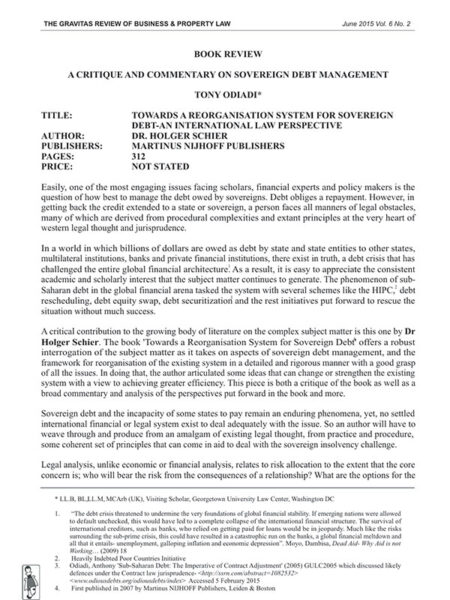
Towards a Reorganisation System for Sovereign Debt – An International Law Perspective
0₦2,500.00Tony Odiadi, Visiting Scholar, Georgetown University Law Center, Washington DC, reviews the book “Towards a Reorganisation System for Sovereign Debt – An International Law Perspective” written by Holger Schier. Easily, one of the most engaging issues facing scholars, financial experts and policy makers is the question of how best to manage the debt owed by sovereigns. Debt obliges a repayment. However, in getting back the credit extended to a state or sovereign, a person faces all manners of legal obstacles, many of which are derived from procedural complexities and extant principles at the very heart of western legal thought and jurisprudence.
-
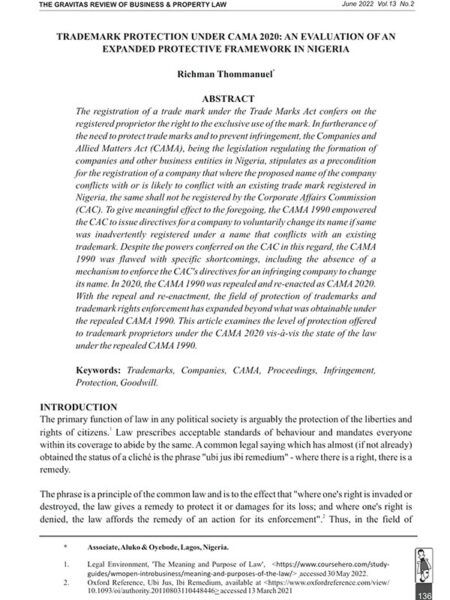
Trademark Protection Under the Companies and Allied Matters Act 2020: An Evaluation of an Expanded Protective Framework in Nigeria
0₦2,500.00Richman Thommanuel, Associate, Aluko & Oyebode, in his article, Trademark Protection Under the Companies and Allied Matters Act 20202: An Evaluation of an Expanded Protective Framework in Nigeria, explains that in furtherance of the need to protect trademarks and prevent infringement, the Companies and Allied Matters Act (CAMA) stipulates as a precondition for the registration of a company, that where the proposed name of the company conflicts with or is likely to conflict with an existing trade mark registered in Nigeria, the name shall not be registered by the Corporate Affairs Commission (CAC). To give meaning to the provision, the CAMA 1990 empowered the CAC to issue directives for a company to voluntarily change its name if the same was inadvertently registered under a name that conflicts with an existing trademark. Despite the powers conferred on the CAC in this regard, the CAMA 1990 was flawed with shortcomings, including the absence of a mechanism to enforce the CAC’s directives for an infringing company to change its name. This lacuna has been addressed by CAMA 2020. Richman examines the expanded protective framework under the re-enacted CAMA.
-
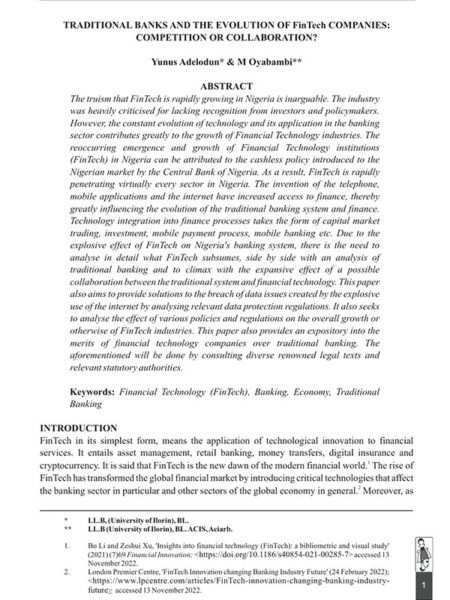
Traditional Banks and the Evolution of Fintech Companies: Competition or Collaboration?
0₦2,500.00Yunus Adelodun and M. Oyabambi in their article, Traditional Banks and the Evolution of Fintech Companies: Competition or Collaboration? examine the growing recognition of Fintechs, their technology and its application in the banking sector. They analyze in details what Fintech subsumes, side by side an analysis of traditional banking and climaxed with the expansive effect of a possible collaboration between the traditional system and financial technology. They provide solutions to the breach of data issues created by the explosive use of the internet, by providing an analysis of relevant data protection regulations. They also provide an expository into the merits of financial technology companies over traditional banking.
-
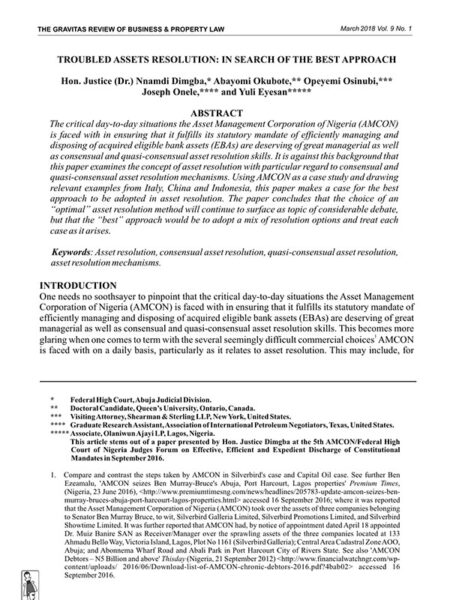
Troubled Assets Resolution in Search of the Best Approach
0₦2,500.00Hon. Justice (Dr) Nnamdi Dimgba of the Federal High Court Abuja, and the quartet of Abayomi Okubote, Opeyemi Osinubi, Joseph Onele and Yuli Eyesan in their paper, “Troubled Assets Resolution-In Search of the Best Approach”,examine the concept of asset resolution with particular regard to consensual and quasi-consensual resolution mechanisms. Using AMCON as a case study, and analysing its mandate to manage and dispose of acquired eligible banks assets (EBAs), and drawing relevant examples from Italy, China and Indonesia, they consider adversarial recovery methods, and non-adversarial consensual or quasi-consensual resolution options by which the ‘toxic assets bank’ may fulfill its mandate. They conclude that the “best” approach would be to adopt a mix of resolution options and treat each case as it arises.
-
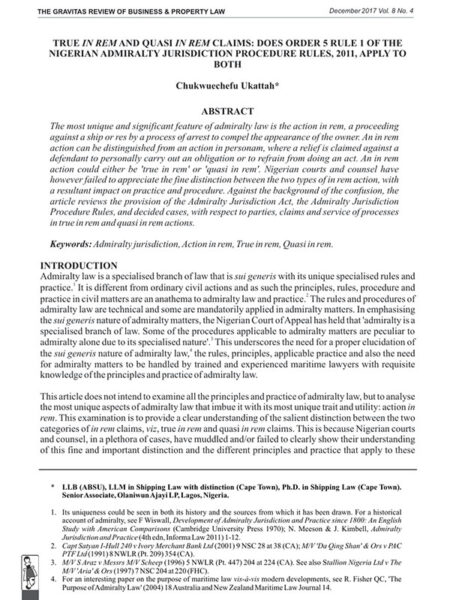
True in Rem and Quasi in Rem Claims: Does Order 5 Rule 1 of the Nigerian Admiralty Jurisdiction Procedure Rules 2011, Apply to Both
0₦2,500.00Dr. Chukwuechefu Ukattah, Senior Associate, Olaniwun Ajayi LP, in his article, “True In Rem and Quasi In Rem Claims: Does Order 5 Rule 1 of the Nigerian Admiralty Jurisdiction Procedure Rules, 2011, Apply to Both?”, notes that an in rem action could either be ‘true in rem’ or ‘quasi in rem’. He argues that Nigerian courts and counsel, have however failed to appreciate the distinction between the two types of in rem action, with a resultant impact on practice and procedure. Against the background of the confusion, he reviews the provision of the Admiralty Jurisdiction Act, the Admiralty Jurisdiction Procedure Rules, and decided cases, with respect to parties, claims and service of processes in true in rem and quasi in rem actions.
-
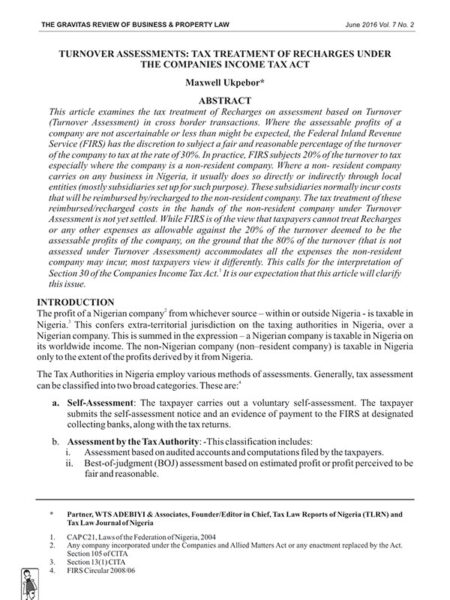
Turnover Assessments: Tax Treatment of Recharges under the Companies Income Tax Act
0₦2,500.00Maxwell Ukpebor, Partner, WTS ADEBIYI & Associates, Founder/Editor in Chief, Tax Law Reports of Nigeria (TLRN) and Tax Law Journal of Nigeria in his article “Turnover Assessments: Tax Treatment of Recharges Under the Companies Income Tax Act” examines the unsettled issue of tax treatment of Recharges on Turnover Assessment in cross border transactions. Where the assessable profits of a company are not ascertainable or less than might be expected, the Federal Inland Revenue Service (FIRS) has the discretion to subject a fair and reasonable percentage of the turnover of the company to tax at the rate of 30%. In practice, where the company is a non-resident company, FIRS subjects 20% of the turnover to tax. Costs incurred by local subsidiaries of non-resident companies are normally reimbursed by/recharged to the non-resident company. Are the costs and expenses (called Recharges) allowable or not against the 20% Turnover? While most tax payers believe they are allowable, FIRS “thinks not”. Mr. Ukpebor in this masterly exposition clarifies the issue in controversy.
-
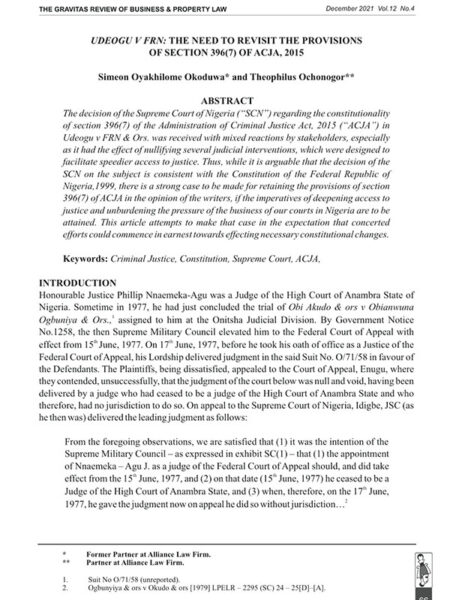
Udeogu v FRN: The Need to Revisit the Provisions of Section 396(7) of ACJA 2015
0₦2,500.00Simeon Okoduwa and Theophilus Ochonogor of the Alliance Law Firm, in their article, Udeogu v FRN: The Need to Revisit the Provisions of Section 396(7) of ACJA 2015, note that the decision of the Supreme Court which declared section 396(7) of ACJA, 2015 as inconsistent with the 1999 Constitution and therefore void needs to be revisited. The Section provides that a Judge of the High Court who has been elevated to the Court of Appeal shall have dispensation to continue to sit as a High Court Judge to conclude any part-heard criminal matter pending before him at the time of his elevation. Okoduwa and Ochonogor argue that if the imperatives of deepening access to justice and unburdening the pressure of the business of courts are to be attained, the Section needs to be retained.
-
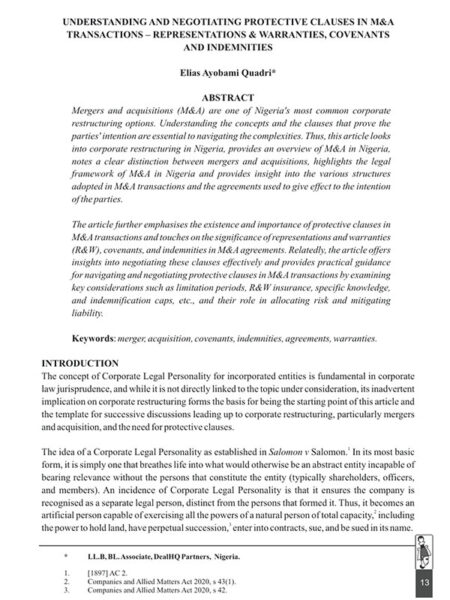
Understanding and Negotiating Protective Clauses in M&A Transactions – Representations & Warranties, Covenants & Indemnities
0₦2,500.00Elias Ayobami Quadri, in his article, Understanding and Negotiating Protective Clauses in M&A Transactions – Representations & Warranties, Covenants and Indemnities, discusses the legal effect of representation, warranties, covenants and indemnities in merger and acquisition transactions. In corporate restructurings, a clear understanding of the concepts and the clauses that evidence the intention of the parties are essential to navigating the complexities present therein. Elias looks into corporate restructuring in Nigeria, provides an overview of M&A in Nigeria, noting a clear distinction between mergers and acquisition, highlighting the legal framework of M&A in Nigeria, and providing insight into the various structures adopted in M&A transactions and the agreements used to give effect to the intention of the parties. Elias further emphasizes the existence and importance of protective clauses in M&A transactions and touches on the significance of representations and warranties (R&W), covenants, and indemnities in M&A agreements. Relatedly, Elias offers insights into negotiating these clauses effectively, and provides practical guidance for navigating and negotiating protective clauses in M&A transactions by examining key considerations such as limitation periods, R&W insurance, specific knowledge, and indemnification caps, etc., and its role in allocating risk and mitigating liability.
-
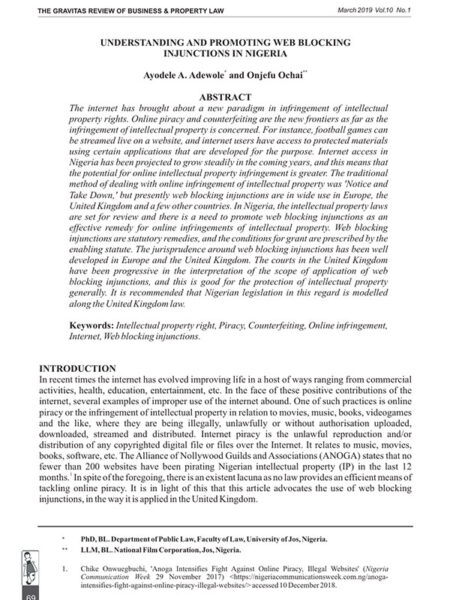
Understanding and Promoting Web Blocking Injunctions in Nigeria
0₦2,500.00Dr Ayodele Adewole of the University of Jos Nigeria,and Onjefu Ochai of the National Film Corporation Jos Nigeria, in their article, Understanding and Promoting Web Blocking Injunctions in Nigeria, observe that the internet has brought about a new paradigm in infringement of intellectual property rights. Online piracy and counterfeiting are the new frontiers as far as the violation of intellectual property is concerned. The traditional method of dealing with online infringement of intellectual property was ‘Notice and Take Down,’ but presently web blocking injunctions are in extensive use in Europe, the United Kingdom and a few other countries where the jurisprudence around web blocking injunctions has been well developed. They observe that the incorporation of measures to deal with online piracy and counterfeiting in Nigeria is long overdue, and web blocking injunctions are the favoured means of achieving this. They recommend reform of Nigerian copyright laws in line with the UK law which has greatly evolved over the course of time.
-
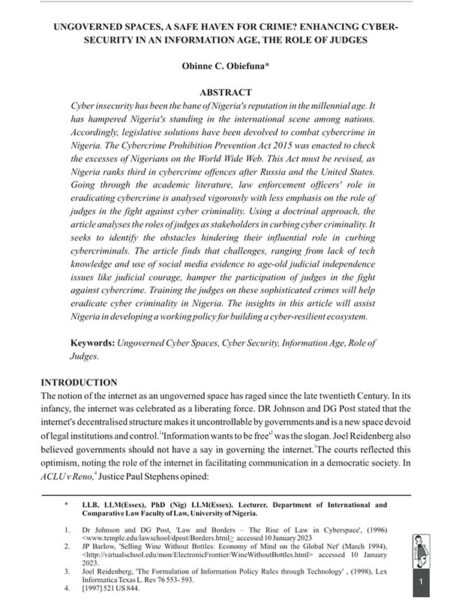
Ungoverned Spaces, a Safe Haven for Crime? Enhancing Cyber-Security in an Information Age, the Role of Judges
0₦2,500.00Dr. Obinne C. Obiefuna, in his article, Ungoverned Spaces a Safe Haven for Crime? Enhancing Cyber-Security in an Information Age, the Role of Judges, explores the problem of cyber-crime, the efficacy of extant legislation and the role of judges in effective regulation of cyber security. Cyber insecurity has been the bane of Nigeria’s reputation in the millennial age. It has hampered Nigeria’s standing in the international scene among nations. The Cybercrime Prohibition Prevention Act 2015 was enacted to check the excesses of Nigerians on the World Wide Web. This Act has been less than effective as Nigeria ranks third in cybercrime offences after Russia and United States. Going through academic literature, the role of law enforcement officers in eradication of cybercrime is analyzed vigorously with less emphasis on the role of judges in the fight against cyber criminality. Using doctrinal approach, Obiefuna analyses the roles of judges as stakeholders in curbing cyber criminality. Obiefuna seeks to identify the obstacles hindering their effective role in curbing cybercriminals. He finds that challenges, ranging from lack of tech knowledge, use of social media, evidence of the age old judicial independence issues like judicial courage hamper the participation of judges in the fight against cybercrime. Obiefuna suggested that emphasis on training the judges on these sophisticated crimes will help to eradicate cyber criminality in Nigeria.
-
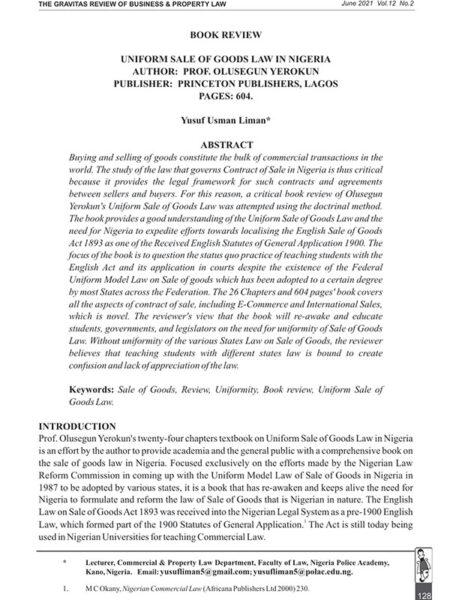
Uniform Sale of Goods Law in Nigeria by Prof. Olusegun Yerokun
0₦2,500.00Yusuf Usman Liman, Lecturer, Faculty of Law, Nigeria Police Academy, Kano Nigeria, reviews the book, Uniform Sale of Goods Law in Nigeria by Prof. Olusegun Yerokun, highlighting that the book provides a good understanding of the need for concerted efforts towards uniformity of the Federal and State Laws on Sale of Goods. Using the review as a backdrop, Liman examines the current state of the law with regards to the status of the Sale of Goods Act 1893, an English Statute of General Application.
-
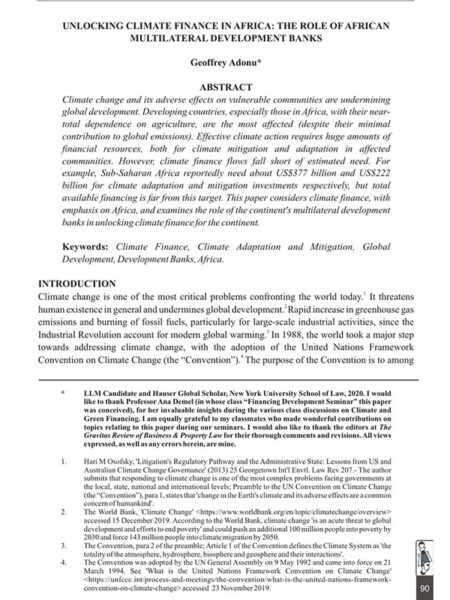
Unlocking Climate Finance in Africa: The Role of African Multilateral Development Banks
0₦2,500.00Geoffrey Adonu, Graduate Student at the New York University School of Law in, Unlocking Climate Finance in Africa: The Role of African Multilateral Development Banks, argues that climate change and its adverse effects on vulnerable communities are undermining global development. Developing countries, especially those in Africa, with their near-total dependence on agriculture, are the most affected despite their minimal contribution to global emissions. Effective climate action requires enormous amounts of financial resources, both for climate mitigation and adaptation in affected communities. However, climate finance flows fall short of the estimated need. Sub-Saharan Africa reportedly needs about US$377 billion and US$222 billion for climate adaptation and mitigation investments respectively, but total available financing is far from this target. Geoffrey considers climate finance, with emphasis on Africa, and examines the role of the continent’s multilateral development banks in unlocking climate finance for the continent.
The Gravitas Review of Business & Property Law



